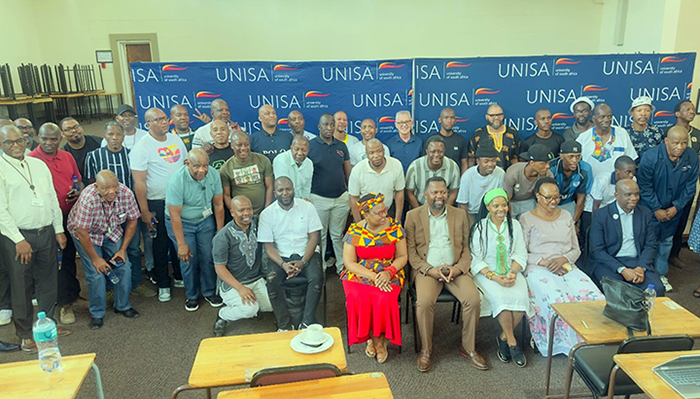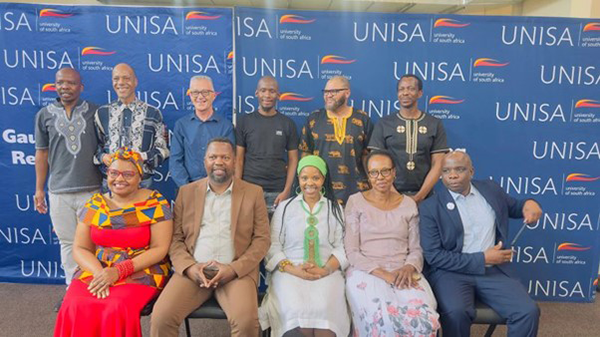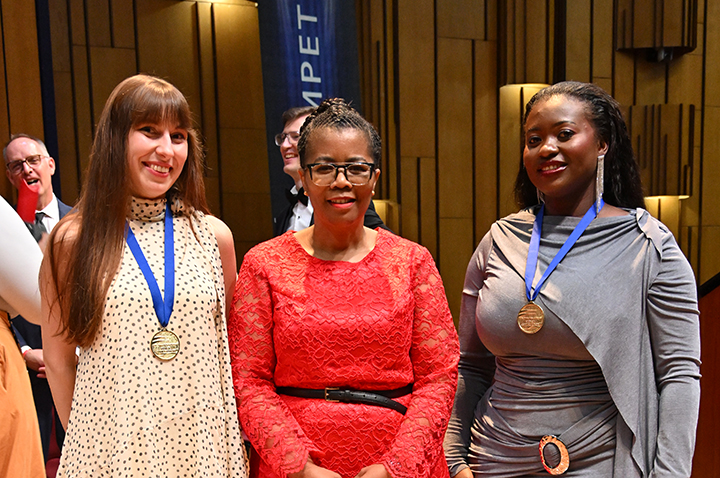

Attendees and presenters at the symposium
The Unisa Women’s Forum, in collaboration with the College of Education, Registrar’s Portfolio, Department of Quality Assurance and Enhancement, and other role players in the university’s academic community, hosted a thought-provoking Father and Son Symposium at the Sunnyside Campus in Tshwane on 23 September 2025. The event confronted two pressing challenges facing South Africa today: fatherlessness and its links to gender-based violence and femicide (GBVF).
The symposium drew a diverse gathering of academics, researchers, social workers, unionists, students, pastors and educators, united by a shared commitment to rebuilding father-son relationships and strengthening communities.
Setting the tone for the day, Dr Vuyo Sigaqa, Centre Manager and Project Leader of the Boys and Young Men’s Engaged Scholarship Project, reminded attendees of the communal responsibility of fatherhood. "We can raise a child as a woman, but we have to work in the village to create a man. It takes a village to parent, mentor and guide boys into becoming men," she said. Her words framed the symposium not just as an academic exercise, but as a call to collective action.
Keynote speaker Zibuze Kunene, a Unisa Payroll Specialist, author and life coach, emphasised the influence of the environment on young people. He cautioned against the dangers of a culture normalising alcohol and taverns, which often derail youth from their potential.
Other notable speakers included Sammy Ralekholela (transformational speaker, author, life coach and pastor) and Prof Dikeledi Mahlo (Professor of Inclusive Education). Their insights reinforced the crucial role fathers play in shaping society and nurturing resilience in their sons.

Back, from left: Kagiso Mekoe, Unisa Student Counsellor; Dr Mbongiseni Mdakana, Unisa Senior Lecturer; Frans Nel; Khutatso Dibakwane, Unisa Quality Assurance and Enhancement Intern; Dr Loyiso Luvalo, Unisa College of Education; and Dr Daniel Mosako, Unisa Acting CoD Department of Art and Music
Front, from left: Prof Dikeledi Mahlo, Unisa College of Education; Pastor Sammy Ralekholela; Dr Vuyokazi Sigaqa, Unisa Centre Manager; Prof Khanyisile Mbatha, Unisa Women’s Forum Chairperson; and Fhatuwani Makahane, Unisa Student Counsellor and Psychologist
A highlight of the day was a student-led panel discussion moderated by Dr Mbongiseni Mdakane, Senior Lecturer in Psychology. The platform allowed the younger sons to share their personal experiences of fatherlessness, further underlining the urgent need for dialogue and support.
Participants expressed a strong desire for the symposium to become a recurring platform. As Kagiso Mekoa observed, "The fathers in attendance showed a deep desire to have more of these sessions going forward".
This enthusiasm signals a growing recognition that addressing fatherlessness and GBVF requires consistent engagement, mentorship, and collaboration.
The Father and Son Symposium stands as a testament to Unisa’s broader social agenda – using education, dialogue and community engagement to drive meaningful change. By creating space for men and boys to learn, share and heal, the university is helping to break cycles of neglect and violence.
This event may be only the first step. Still, it represents a bold move towards a future where fathers and sons are empowered to rebuild families, strengthen communities and reduce gender-based violence.
* By Lindelwa Makhanya, Unisa PR Student, and Olebogeng Mokgethi, Assistant Supervisor: Finance
Publish date: 2025/10/09
 Unisa empowers award-winning agro-cosmetics entrepreneur
Unisa empowers award-winning agro-cosmetics entrepreneur
 Unisa celebrates a project of hope, dignity and student success
Unisa celebrates a project of hope, dignity and student success
 Women vocalists take top honours at Unisa's globally renowned showcase
Women vocalists take top honours at Unisa's globally renowned showcase
 African wealth is dependent on investment in education and development
African wealth is dependent on investment in education and development
 Unisa celebrates matric result success at Correctional Services ceremony
Unisa celebrates matric result success at Correctional Services ceremony